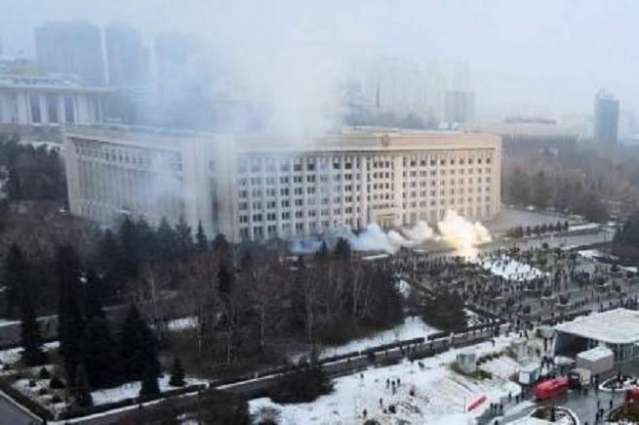The speedy response of the Collective Security Treaty Organization (CSTO) to the crisis in Kazakhstan and the deployment of the CSTO peacekeepers prove that the organization is working as intended and gives hope the situation will be resolved quickly, Nina Bachkatov, an expert on Russia and the post-Soviet space from the University of Liege in Belgium, told Sputnik
BRUSSELS (Pakistan Point News / Sputnik - 07th January, 2022) The speedy response of the Collective Security Treaty Organization (CSTO) to the crisis in Kazakhstan and the deployment of the CSTO peacekeepers prove that the organization is working as intended and gives hope the situation will be resolved quickly, Nina Bachkatov, an expert on Russia and the post-Soviet space from the University of Liege in Belgium, told Sputnik.
The spontaneous civil unrest in Kazakhstan came "out of the blue," especially given the country's high potential for its mineral wealth, such as uranium or cobalt, essential for the global green transition, Bachkatov noted. Many countries, including China, have invested heavily in Kazakhstan, which has benefited from a 30-year long period of stability under the strong regime of former leader Nursultan Nazarbayev, the expert said.
Bachkatov believes that the political opposition of the current government does not identify itself with the riots and violent clashes between the police and armed militant groups on the streets of Kazakh cities.
"This destabilization of the most important country in Central Asia is far more frightening than what is happening in Ukraine. The hasty departure of the Americans and NATO from Afghanistan and the resulting population movements in the region are having a deleterious effect on the political balance," the expert said.
With the rise of extremism in Central Asia following the power change in Afghanistan, the regional countries are especially fragile, according to the expert. Kazakhstan is not an exception: here, just as in other nations in the region, the huge wealth disparity, wide-spread corruption and ineffective state controls over drug and other forms of trafficking contribute to public discontent.
The nearly twofold increase in the gas prices in the beginning of January further sparked the public dissatisfaction, which, given the circumstances, lead to the violence across Kazakhstan, Bachkatov explained.
"All of this is very dangerous for the countries of the region and Islamism could emerge where it is not expected," she added.
Against this backdrop, the speed of the CSTO response, whose peacekeeping units have already arrived in Kazakhstan from several countries in the region, proves that the organization is working and is an encouraging sign for the quick resolution of the internal conflict in Kazakhstan, Bachkatov said. Restoration of order is the priority right now, she said, so that the government can focus on resolving economic issues that are troubling the population.
"Of course, critics of Russia speak of the use of force and the maintenance of an unpopular power by Moscow in the country, but Westerners must remember that they themselves, in recent decades, saw Kazakhstan as an economic model for the countries of the former USSR. They only had nice words for the regime. Trade relations are still good today," Bachkatov noted.
The European Union now refrains from strong reactions concerning the dispatch of the CSTO peacekeepers and limits itself to calls for exercising restraint, she said. However, Bachkatov thinks the West underestimates the fragility of the Central Asian states and has a generally wrong understanding of the power structures there.
"Another problem is the family clans in Kazakhstan, which are described as 'ethnic groups' in the West, and which the political power has succeeded in controlling under Nazarbayev and his successor (Kazakh President Kassym-Jomart) Tokayev, but their competition can always lead to serious disorders," Bachkatov said.




